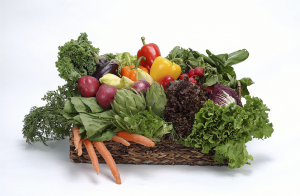Healthy Diet for Fall and Winter Wellbeing

HEALTHY DIET FOR FALL AND WINTER WELLBEING
By Tanuja Dabir, Registered Holistic Nutritionist
 We had a fantastic summer this year, especially here on the west coast.
We had a fantastic summer this year, especially here on the west coast.
Come fall and now there is a slight chill in the air and the leaves are changing to beautiful shade of amber, burgundy and brown before finally falling off. This is perfect time to start thinking about how to eat nutritiously to thrive through the upcoming cold, damp and dark days.
Fall and winter give us many opportunities to celebrate life- Thanksgiving, Halloween, Christmas, Hanukkah, and Diwali and so on. So how can we nourish ourselves sensibly during the fall and winter months?
Food is one of our basic necessities besides water and air. It nourishes us, strengthens us and is a part of our celebrations and get-togethers.
Yet, practically speaking we are possibly at the peak of confusion in these modern times about how to feed ourselves. There are a plethora of different diet trends surrounding us, and we are always questioning if our eating habits are right or not?
Technology is supposed to make things easier, but doesn’t it look like we have complicated our lives way too much? We get overwhelmed by terms like GMO, organic foods, Paleo diet, raw diet and so on.
The funny part is that it actually doesn’t have to be so complicated! All we really need to do is go back to the basics of food and simplify things. Do it like your grandma or your great-grandma would have done! And you don’t even have to toil for hours in the kitchen like them, as you now have all the modern gadgets in the kitchen to help you make it quick and easy.
So here are some tips to eating healthy and nutritiously this fall/ winter:
You are unique, so are your dietary needs:
- People often ask me, what do you think of so-and-so diet? Should I follow it? My friend lost 50 lbs on it, it seems to work!
- We are all unique, and so should be our diet. Instead of following diet trends and what your best friend or neighbour next door is doing; listen to your body. Your body tells you exactly what to eat and how much to eat. You just need to tune in and pay attention.
Include the basic food groups in your daily meals:
- Fresh and wholesome fruits, vegetables, whole grains, legumes, lean animal protein and small quantity of healthy oils are what we need to be healthy.
- But instead, we focus on pre-packaged, processed food like items which are loaded with sugar, sodium, chemicals, artificial colors and preservatives. Our bodies are not designed to process such heavy chemical laden stuff! No wonder we are always, tired, achy, bloated and sick.
Eat seasonal foods:
- Nature provides us with the seasonal foods for a reason. These seasonal foods are rich in vitamins and minerals needed to thrive during that particular season.
- Fall/ winter are typically the flu season- and one of the key micronutrients in keeping our immunity strong is zinc. What is zinc found in? Pumpkin!
It’s easy to see why pumpkin is so rampantly found everywhere in this season then, isn’t it?
Note the shift in energy with the changes in temperature:
- Autumn brings about change in energy with the drop in temperatures. We need to keep warm, and hence the warming root vegetables and squashes, nuts and seeds, whole grains and legumes are ready for harvest just in time for us to enjoy!
- The diet therefore needs to shift from light summer foods like fruit punches and salads and to hearty soups and baked, roasted and warm casseroles.
Eat warming foods:
- Our bodies are always meant to be in a balanced state/ equilibrium. It’s just natural. So come the cold weather, it is obvious that we eat warming foods.
- You might have heard of the Chinese Yin and Yang theory. Simply put, it is a classification system of opposite categories. One of the balances it talks about is warming and cooling foods.
- Some examples of warming foods are: cooked and dried fruits, cabbages, root vegetables, lentils, kidney beans, yams, oats, winter quashes, tomato sauces, avocadoes, tempeh eggs, poultry, fish, chocolate, butter, cream and potato.
- Some warming spices to consume would be: cumin, ginger, garlic, caraway, oregano, black pepper, cinnamon, cloves and miso.
Eat alkalising foods:
- As we noted earlier, this season is full of festivals and celebrations. With that come the foods rich in fat, sugar and dairy. These foods are acidic in nature. But our bodies are alkaline! So over consumption of these foods lead to acidic conditions in our body- resulting in inflammation, aches and pains, congestion and the yucky feeling we get when we’ve gone overboard with our feasting.
- The solution then is to ensure that you moderately enjoy the festive foods. The bigger part of your diet should be of alkalising foods, like: most fruits, vegetables, sea vegetables like kelp, nori, green beans, peas and miso.
Eat a variety of foods:
- Different foods provide us with different nutrients. Therefore it’s crucial that you consume a wide variety of foods to reap their benefits. If you over indulge in only a few foods or are picky about your choices- there is a good chance you are missing out on the wonderful benefits of vitamins and minerals you could have gotten from the foods you are not consuming.
- Eating various foods also reduces the chances of one becoming allergic or sensitive to foods you over indulge in. It’s a win-win situation really.
Your wellbeing is in your hands.
You do have to commit to prioritising feeding yourself and your family healthy, wholesome and nutritious meals. And that is the answer to living a long, vibrant and healthy life. That’s one thing gadgets and machines can’t do — at least yet.
Wishing you the best of health and spirits.

